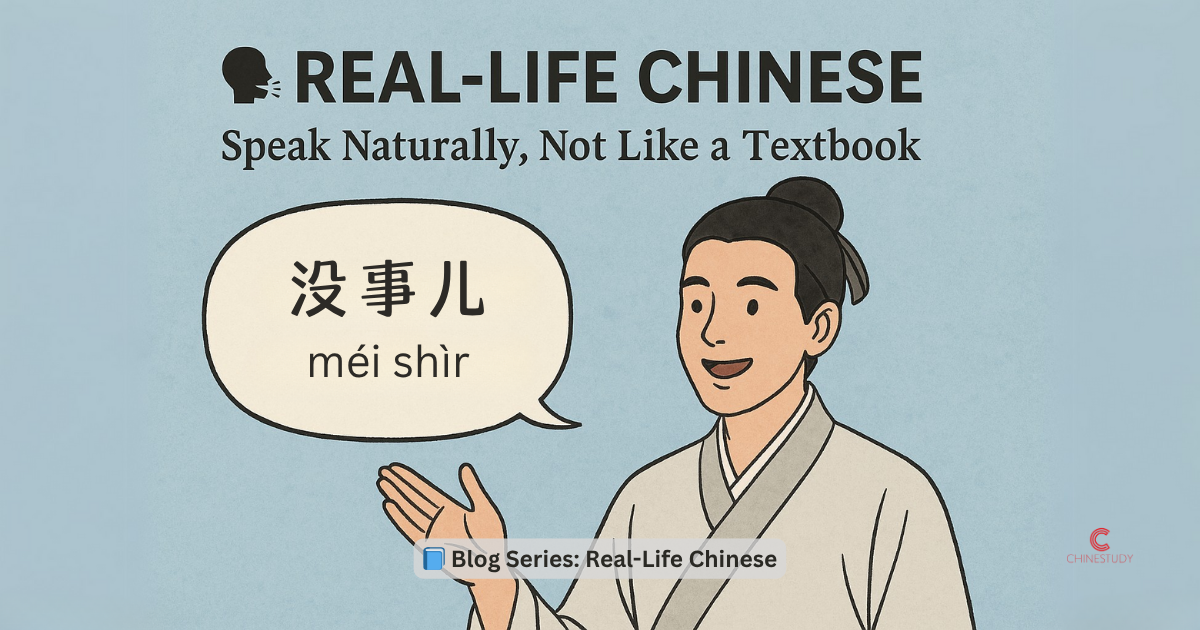How to Say “It’s Okay” Naturally in Chinese — Not Just “没关系”

📕 Textbook Chinese
没关系。(Méi guānxi.)
“It’s okay.” / “No problem.”
It’s a very common phrase in textbooks and classrooms.
But in daily life, it can sometimes sound a little stiff — or too serious.
✅ Real Chinese
Use these softer, more casual ways to say “it’s okay” or “don’t worry”:
- 没事儿 (méi shìr) – “No problem” / “It’s nothing”
- 没什么啦 (méi shénme la) – “It’s really nothing” (friendly, laid-back)
- 没事没事 (méi shì méi shì) – Said quickly, sounds warm and natural
These are relaxed, everyday phrases — perfect for spoken Chinese.
💡When to Use Them
Say these when:
✔️ Someone apologizes to you
✔️ A friend makes a small mistake
✔️ Someone thanks you for something minor
✔️ You want to reassure or comfort someone
These phrases are great when you want to show warmth and downplay an issue — just like native speakers do!
🧱 Example Sentences
1.
A:对不起,我来晚了。
(Duìbuqǐ, wǒ lái wǎn le.)
Sorry, I’m late.
👉 没事儿。
(Méi shìr.)
No problem.
2.
A:谢谢你帮我拿东西!
(Xièxie nǐ bāng wǒ ná dōngxi!)
Thanks for carrying that for me!
👉 没什么啦~
(Méi shénme la~)
It’s really nothing!
3.
A:我不小心碰到了你。
(Wǒ bù xiǎoxīn pèng dào le nǐ.)
I accidentally bumped into you.
👉 没事没事~
(Méi shì méi shì~)
It’s okay, really!
🤓 Why It Sounds Better
- Feels gentle, friendly, and natural
- Matches how people speak in real life
- Reduces awkwardness — especially in small mistakes
⚠️ Common Mistake
🚫 Using “没关系 (méi guānxi)” for every situation.
It’s polite, but can sound stiff or too formal in casual settings.
✅ Try instead:
- 没事儿 (méi shìr) – Simple, friendly, everyday
- 没什么啦 (méi shénme la) – A touch of warmth and care
- 没事没事 (méi shì méi shì) – Quick, smooth, and very real
🏆 Quick Practice
Someone says:
“我刚才说错了。”
(Wǒ gāngcái shuō cuò le.)
I said the wrong thing just now.
Which reply sounds more natural?
A. 没关系。
B. 没事儿。
✅ Correct Answer: B
✨ Final Thoughts
“没关系” is safe — but not always the most natural.
Try these real-life expressions next time:
💬 没事儿 (méi shìr)
💬 没什么啦 (méi shénme la)
💬 没事没事 (méi shì méi shì)
They’ll make your Chinese sound warm and smooth.
📘 Want more like this? Check out the full blog series: Real-Life Chinese
Thank you for subscribing!
Have a great day!